Ditapis dengan
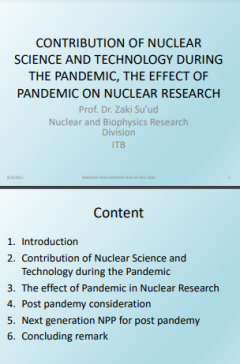
CONTRIBUTION OF NUCLEAR SCIENCE AND TECHNOLOGY DURING THE PANDEMIC, THE EFF…
Content: 1. Introduction 2. Contribution of Nuclear Science and Technology during the Pandemic 3. The effect of Pandemic in Nuclear Research 4. Post pandemy consideration 5. Next generation NPP for post pandemy 6. Concluding remark
- Edisi
- -
- ISBN/ISSN
- -
- Deskripsi Fisik
- 56 Hal
- Judul Seri
- -
- No. Panggil
- -
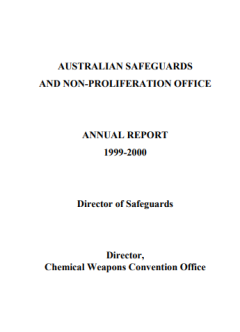
Australian Safeguards And Non Prolifrations Office. Annual Reports 1999 - 200…
The Director General, Australian Safeguards and Non-Proliferation Office (ASNO), combines the statutory office of Director of Safeguards with that of Director, Chemical Weapons Convention Office (CWCO). The Director General also performs the functions of the Director, Australian Comprehensive Test-Ban Office (ACTBO) on an informal basis, as the relevant legislation has not yet come into effect…
- Edisi
- -
- ISBN/ISSN
- 0 642 45019 6
- Deskripsi Fisik
- 124 hal
- Judul Seri
- -
- No. Panggil
- -
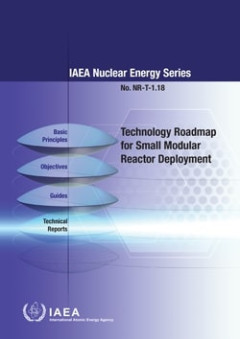
Technology Roadmap for Small Modular Reactor Deployment: IAEA Nuclear Energy …
Given the increasing interest of Member States in the near term deployment of SMRs, this publication presents several model technology roadmaps that States can adapt for their specific projects. For nuclear newcomer countries, these roadmaps assume that a Member State has already developed, or is at least well along the way to developing, the infrastructure necessary to carry out a nuclear powe…
- Edisi
- 2021
- ISBN/ISSN
- 978-92-0-110121-1
- Deskripsi Fisik
- 124 p
- Judul Seri
- -
- No. Panggil
- 621.039.5 IAE t
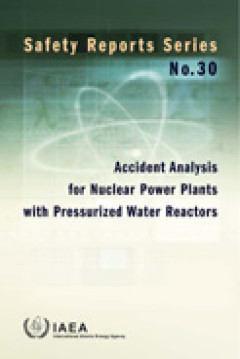
Safety Reports Series No. 30: Accident Analysis for Nuclear Power Plants with…
The objective of this publication is to provide specific guidance for accident analysis for nuclear power plants with pressurized water reactors, taking into account the specific design features of these reactors. This guidance covers all steps required to perform such analyses, including selection of initiating events, acceptance criteria, computer codes, modelling assumptions, preparation of …
- Edisi
- -
- ISBN/ISSN
- 92-0-110603-3 / 1020-6450
- Deskripsi Fisik
- 65 p. : Illus. ; 24 cm
- Judul Seri
- Safety Reports Series
- No. Panggil
- -
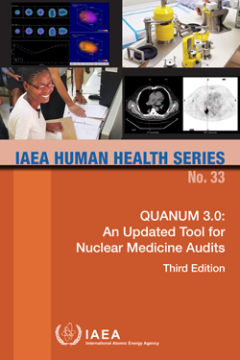
QUANUM 3.0: An Updated Tool for Nuclear Medicine Audits Third Edition | IAEA …
The present publication defines an updated methodology and tools for comprehensive auditing, including all aspects of nuclear medicine. Adopting these guidelines will allow an NMS to demonstrate the level of efficiency, quality, safety and reliability in delivering clinical services.
- Edisi
- -
- ISBN/ISSN
- 978-92-0-127120-4
- Deskripsi Fisik
- 87 Hal, 3 MB
- Judul Seri
- -
- No. Panggil
- 616.07575
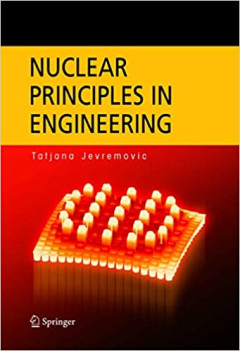
Nuclear Principles in Engineering
Nuclear engineering plays an important role in various industrial, health care, and energy processes. Modern physics has generated its fundamental principles. A growing number of students and practicing engineers need updated material to access the technical language and content of nuclear principles. Nuclear Principles in Engineering is written for students, engineers, physicians and scientist…
- Edisi
- -
- ISBN/ISSN
- 0-387-23284-2
- Deskripsi Fisik
- xix, 442 p : Illus ; 2,1 cm
- Judul Seri
- -
- No. Panggil
- 621.48
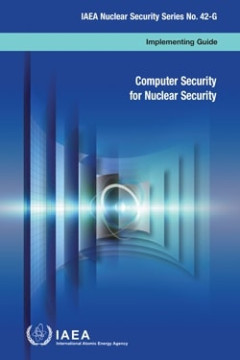
Computer Security for Nuclear Security - IAEA Nuclear Security Series No. 42-G
This publication provides detailed guidance on developing, implementing, and integrating computer security as a key component of nuclear security. This guidance applies to computer security aspects of nuclear security and its interfaces with nuclear safety and with other elements of a State’s nuclear security regime, including the security of nuclear material and nuclear facilities, of radioa…
- Edisi
- -
- ISBN/ISSN
- 978-92-0-121120-0
- Deskripsi Fisik
- 102 p
- Judul Seri
- -
- No. Panggil
- -
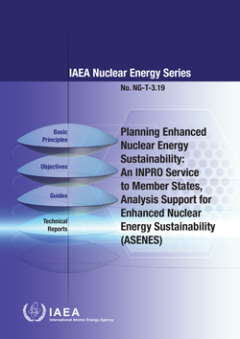
Planning Enhanced Nuclear Energy Sustainability An INPRO Service to Member St…
Energy is a key input for most human activities. It represents an engine for socioeconomic development and is vital for the provision of basic public services such as health care, education, clean water and sanitation. A lack of access to a reliable, affordable and modern energy supply is a major challenge to achieving the Sustainable Development Goals1 (SDGs) [1].
- Edisi
- -
- ISBN/ISSN
- 978-92-0-105121-9
- Deskripsi Fisik
- 51 p
- Judul Seri
- -
- No. Panggil
- 621.48 IAE P
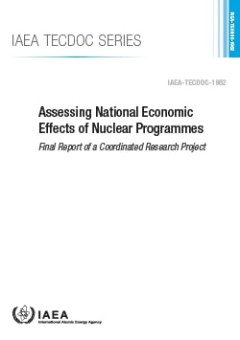
Assessing National Economic Effects of Nuclear Programmes Final Report of a C…
This publication presents the outcomes of an IAEA coordinated research project on assessing the national economic effects of nuclear programmes in participating Member States. It provides a short description of the extended input–output model for sustainable power generation (EMPOWER), developed by the IAEA, and presents concise summaries of its applications. It further includes the results p…
- Edisi
- -
- ISBN/ISSN
- 978-92-0-117321-8
- Deskripsi Fisik
- 144 p
- Judul Seri
- -
- No. Panggil
- 330
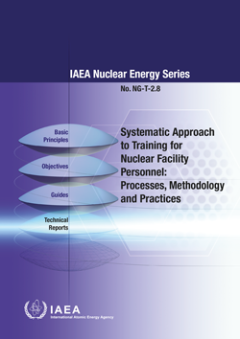
Systematic Approach to Training for Nuclear Facility Personnel: Processes, Me…
Training is an important tool to achieve and maintain the required competence of personnel working in nuclear facilities. Effective training and qualification of personnel are necessary for the achievement of high safety and efficiency standards in nuclear facility performance. Training and qualification combined is a key feature of the integrated management systems of nuclear facilities. It is…
- Edisi
- -
- ISBN/ISSN
- 978-92-0-113320-5
- Deskripsi Fisik
- 171 Pages
- Judul Seri
- -
- No. Panggil
- -
 Karya Umum
Karya Umum  Filsafat
Filsafat  Agama
Agama  Ilmu-ilmu Sosial
Ilmu-ilmu Sosial  Bahasa
Bahasa  Ilmu-ilmu Murni
Ilmu-ilmu Murni  Ilmu-ilmu Terapan
Ilmu-ilmu Terapan  Kesenian, Hiburan, dan Olahraga
Kesenian, Hiburan, dan Olahraga  Kesusastraan
Kesusastraan  Geografi dan Sejarah
Geografi dan Sejarah